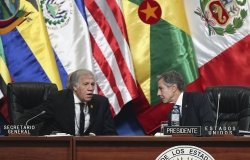México en la Globalidad/Mexico in the Global World
Enrique Peña Nieto, Governor, State of Mexico
Overview
Enrique Peña Nieto
, the governor of the State of Mexico and prospective presidential contender for the PRI in 2012, outlined the challenges Mexico must overcome in order to deliver the progress its citizens expect. Ten years after the Institutional Revolutionary Party (PRI) lost the presidency for the first time in more than seventy years, the governor challenged critics who suggested that the return of the PRI to power would amount to a step backward. He used the refrain, "How wrong they are!," to rebuke critics who have questioned the party's commitment to democracy and disputed its determination to take on the drug cartels. He affirmed that his party would support the consolidation of Mexican democracy and would continue to combat drug-trafficking and organized crime, bringing to bear the full force of government on these problems.
"Mexico cannot allow—and it is unacceptable (to allow)—the presence of organized crime groups that are challenging and, in some cases, even taking over the responsibilities of the Mexican state. Combating organized crime is the work of all, of the entire Mexican state, of all levels of government," the governor said.
Governor Peña Nieto both began and concluded his speech by highlighting the significance of this year's bicentennial celebrations in Mexico, describing them as an opportunity to "redefine [Mexico's] path." He reflected on the positive development of democracy in the country and of a more transparent and competitive political system over the past thirty years. "Today, without a doubt, democracy has arrived in Mexico to stay. Today we are working to consolidate it," he said, asserting that Mexicans now believe in the power of their vote to decide the future of the country and to judge the achievements of the party in power.
Still, the governor lamented the "very low economic growth, almost stagnation" of the decade since the PRI lost the presidency in 2000, noting that 50 million Mexicans are currently living in poverty. He suggested that reform was needed in the following areas:
• Monopolies and oligopolies. Peña Nieto cited a study from the Tec de Monterrey (Instituto Tecnólogico y de Estudios Superiores de Monterrey) demonstrating that Mexicans pay 33 percent more for goods due to the lack of competition.
• Public finances. He referred to the nation's dependence on oil revenue and a small tax base as limiting factors.
• Labor. The governor asserted that expanding government health insurance coverage, increasing unemployment benefits, and strengthening retirement and pension systems would help to grow the formal economy.
• Education. While noting that Mexico has made great strides in expanding its education coverage, Governor Peña Nieto asserted that the quality of education, along with the number of students going to university, needs to be improved.
The goal must be "growth with equity," balancing development across regional and social lines, stated Peña Nieto.
After stressing his party's commitment to take on drug-trafficking and organized crime toward the end of his prepared remarks, the governor was asked to expand upon these issues in greater detail during the question-and-answer period. He defended the decision to use the Mexican military in the struggle against organized crime, while also hinting that his party would shift back to the police as the lead public security force, stating, "I believe the decision made by the federal government to involve the military in this task was correct, but for us, it is something that cannot be permanent."
Drafted by Christopher Wilson, Graduate Intern, Mexico Institute
Andrew Selee, Director, Mexico Institute. Ph: (202) 691-4088
Hosted By

Mexico Institute
The Mexico Institute seeks to improve understanding, communication, and cooperation between Mexico and the United States by promoting original research, encouraging public discussion, and proposing policy options for enhancing the bilateral relationship. A binational Advisory Board, chaired by Luis Téllez and Earl Anthony Wayne, oversees the work of the Mexico Institute. Read more
Thank you for your interest in this event. Please send any feedback or questions to our Events staff.










